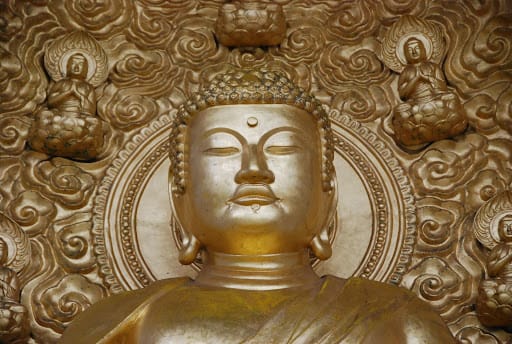According to Buddha, the cause of human suffering is a mind that is not free from desires. So, it is our own mind that causes delusions of pain, distress, and suffering.
We live in a developed country where people have more money and material possessions, but they experience less joy and happiness in their lives. Why is this happening?
Regardless of whether we are rich or poor, many of us worry about money. The majority of people are never satisfied because their lives are controlled by greed-by wanting to have more. People generally cling to comfort, pleasure, and self-indulgence ignorant of the fact that the desire manifested in greed for wealth or material gain is the actual cause for suffering. So, they let their own desires run into greed and therefore, they suffer.
People often destroy their relationships with others and ruin their lives in an attempt to satisfy their desires. They will lie, cheat, steal, fight and even kill each other to satisfy their own desires. As a result, they will suffer because of their selfish acts and behaviours, and from the disgrace of it and its punishment.
As the well-known Japanese writer, Bukkyo Dendo Kyokai proclaimed, “Human desires are endless. It is like the thirst of a man who drinks salt water: he gets no satisfaction and his thirst is only increased.” So, if you constantly seek fulfilment of your own desires you can only gain increased dissatisfaction and disappointment, as you will never be satisfied.
What is desire? And how our desires can lead to suffering?
Desire is a strong feeling of wanting to have something or wishing for something to happen. It is a sense of longing or hoping for a person, or an object, or the outcome of a situation. In essence, the cause of human suffering is a mind that is not free from desires. Desire is bondage. Desire is dis-ease. Desire means that right here and now you are not at ease, and something else in the future, if fulfilled, will bring you peace and happiness. This tension of the mind for the future is desire. Hence, whether fulfilled or not, every desire leads to suffering and misery.Whether fulfilled or not, every desire eventually leads to misery. Could you explore more on this?
You need to understand that desire is very sneaky, it is like a snake. We think it’s our friend, but all it does is cause us suffering. Anger is more obvious, because we can see that it makes us unhappy, and also causes a lot of destruction in ourselves and those around us. But desire looks like our friend, however like a thief, it steals our happiness. This is the real cause for all greed, anger, jealousy, suffering, misunderstanding, conflicts, and even wars.
We also need to understand that all objects of our desires are impermanent and uncertain and that they always lead to suffering. Ordinarily, people grasp and accumulate things for their imagined comfort. For the majority of people, success is measured by the amount of their graspings, material possessions and attachments. Therefore, they suffer because they believe in this illusion. This constant craving for every pleasant thing heard or seen, leads people to suffer. By focusing only on their own comfort and fulfilment of their desire, people often forget the god deeds and favours received by others. They continue to act selfishly, ignorant of the fact that an evil act can only bring suffering and misfortune. People should be more considerate, respectful and empathetic towards each other. They should have more respect for others’ good qualities and values, helping each other in their difficulties, and being happy for others’ successes. Remember that only doing good deeds can bring lasting happiness in your life!

How does desire cause suffering?
Ordinarily, the majority of people in our modern world grasp and accumulate things for their imagined comfort. For most of them, success is measured by the amount of their grasping and attachments to material things. It is important to understand that greed and selfishness are the main causes of human suffering. What causes human suffering is this constant craving for every pleasant thing ever heard or ever seen, leading people into the delusion of bad habits. One of those bad habits is to work too much, too long, or too hard in order to satisfy their own or the desires of their beloved. Some people steal, manipulate, or even kill others to fulfil their desires. Their overwhelming feelings of guilt caused by their actions would cause uneasiness, disturbance, and restlessness. Hence, a person who only thinks of himself and emphasises his self-interest and self-indulgence, would never be happy.Why do we suffer?
It is important to understand that people’s attention tends to move in the direction of their own thoughts. In this regard, it is interesting to note that psychological researchers confirmed that people across the globe have lower levels of consciousness, and therefore, have predominantly negative thought patterns. Based on their research up to eighty percent of the thoughts, spontaneously occurring in an average human being are negative. Essentially, those negative thought patterns stimulate greed, competition, and selfishness, which in turn will cause suffering.
What are the practical steps to overcome suffering?
Step 1. Improve your self-awareness
Firstly, you should identify what causes human suffering and carefully observe your thoughts throughout the day. As soon as you become aware, you should get quickly away from thoughts that stimulate greediness and worldly desires as they arise, to hold the mind pure and tranquil. To free yourself from greed, anger and selfishness, you must practice concentration of the mind, and raise your level of consciousness. You must eliminate all thoughts that stimulate greed, anger, jealousy and selfishness, and encourage thoughts that stimulate love, compassion, and kindness. Remember that if your mind is impure, consequently, your actions will be impure. If your actions are impure, you will suffer. Thus, it is of great importance that you keep your mind pure. If you are filled with peace, love, understanding, and compassion, you won’t be disturbed by the negative words you hear from others. Instead, you will respond in a calm, loving, and respectful manner. Wisdom arises from a peaceful mind, and a pure heart.
Step 2. Look inward and find your inner peace
Not desiring anything is the greatest freedom. It frees you from fear that there is a thing that you can’t have, or that without a certain thing, or an outcome of a situation you won’t be happy. It also frees you from fear and anger. When you have nothing to fear, you have nothing over which to be angry. When fear is taken from you, all else can be taken from you, and yet, you won’t feel angry. Then you will know that everything you’ve created you can create again, or even more importantly, that it won’t matter whether or not you will have that thing again. When you find your inner peace, no person, thing, condition or situation can disturb you, or can change your peaceful state of mind. When you find your peace within, you will find out that you can live happily without many material things of the outside world.
Step 3. Focus on your needs
To avoid suffering and find authentic happiness, people should focus on their needs, and not on their desires. It is important to make a difference between desires (things people want), and needs (things people need). Unfortunately, very few people understand the real meaning of human needs. The term ‘needs’ refers to those requirements which are necessary for a human being to live a healthy and happy life. As needs are essential for life, their non-fulfilment may lead to suffering, illness, and even death. Needs are those items that are required for life, and do not change with time. On the contrary, desires or wants are those items that are desired either right now or in future, and they usually change over time. Desires are something that people wish to have, so as to add comforts in their life. Whether this involves excessive amounts of food, ‘stuff’, news or irrelevant information, in our modern world many of us seem to be awash in those unnecessary things. Desires or wants fall into the category of luxuries – it feels nice to have them, but we can live without them. Some examples of desires are eating out in a restaurant, having a manicure, a plasma TV, designer clothes, etc. Desires are not essential for living and therefore, their non-fulfilment does not have a great impact on a person’s life, however, feelings of disappointment may be present.
Essentially, each of us has physical, mental, spiritual, and social needs and we must meet them on a daily basis. Throughout a day, at any given moment, our current need might be one of the following:
- Physical needs: consuming healthy food and beverages for the body, having a shelter, having an appropriate clothing (just what we need to remain comfortable and appropriately dressed), being engaged in a physical activity etc.
- Mental needs: reading, writing, painting, drawing, playing music etc.
- Spiritual needs: spending time alone in silence, connecting with nature, having a spiritual conversation with a friend, reading books for personal development, listening to relaxing music, doing yoga, meditation etc.
- Social needs: spending quality time with our beloved, having a tea/coffee with a friend, going out and meeting new people etc.
Concentrating on one need at a time and its fulfilment will bring immediate satisfaction. Therefore, you should determine your immediate need in the present and devote all your attention, energy, and effort to attain it by the quickest possible method. This is the most important step in overcoming suffering, and attaining real joy and authentic happiness here and now.
Find more tips on how to overcome suffering and achieve a peaceful state of mind in the life-changing book “Another Way of Living: A Journey to Infinite Peace, Immense Joy and True Freedom (Book 1)” by Dr Snezhana Djambazova-Popordanoska, MD, PhD.

